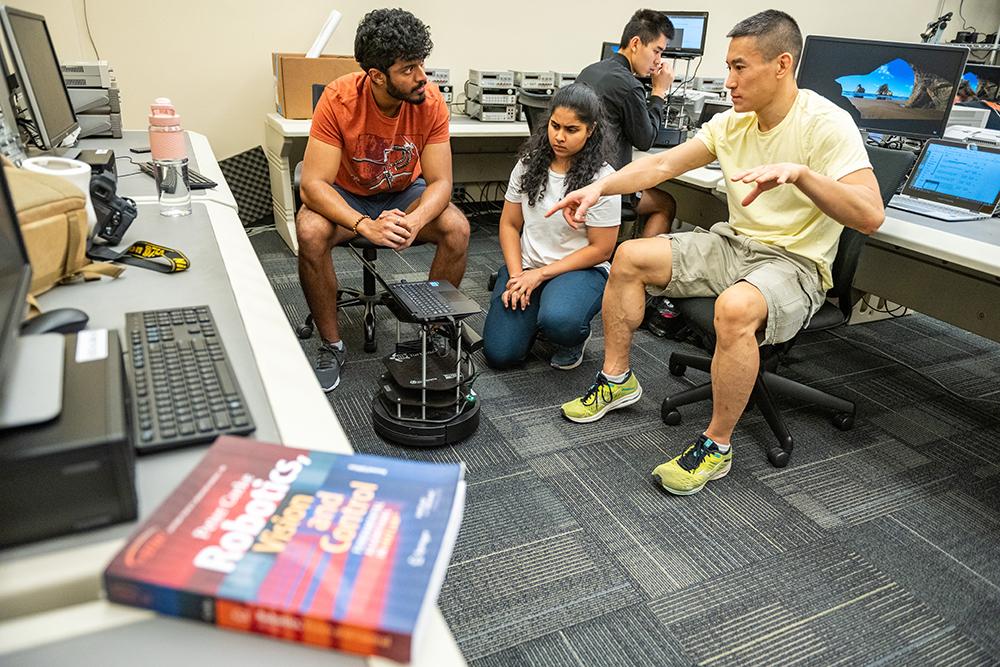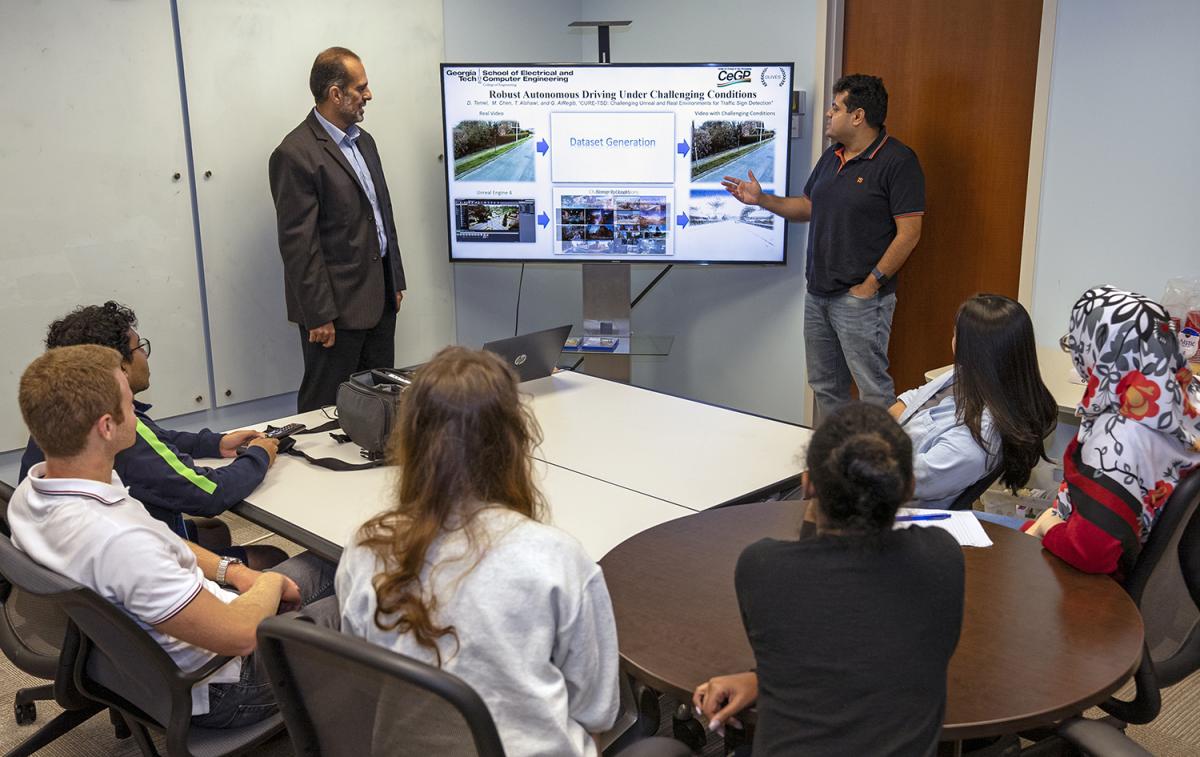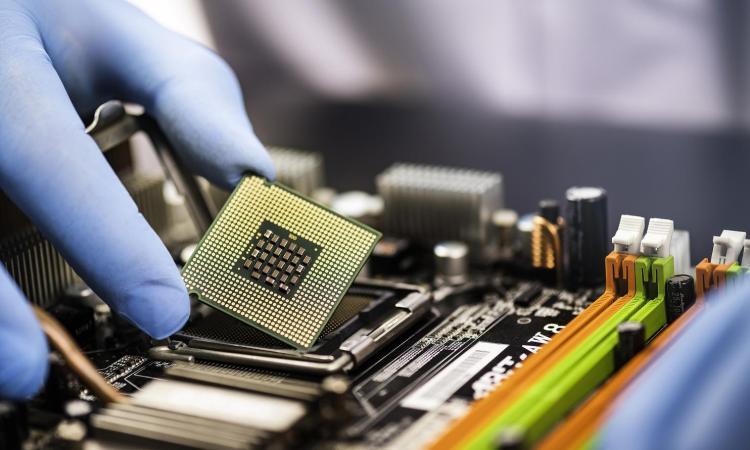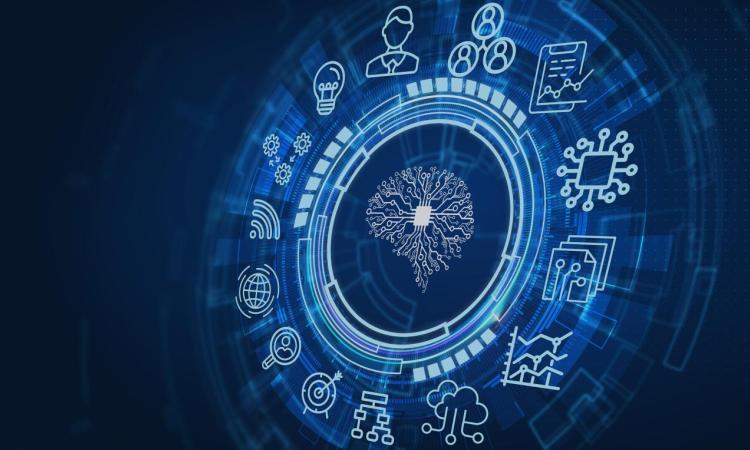Focusing artificial intelligence content in 14 core courses will equip students with knowledge and hands-on experience companies need in their workforces.
(text and background only visible when logged in)
In response to demand from its students, initiatives within faculty research, and increasing needs from industry, Georgia Tech’s College of Engineering is creating new courses and reimagining others to strengthen its artificial intelligence and machine learning education.
Six undergraduate courses launch this spring semester, after another six began this past fall (two courses from fall are repeated this spring). They span six of the College’s eight schools. Topics range from AI in smart cities to machine learning fundamentals to online decision making as the College expands its initiatives to innovate education.
“AI and machine learning have been around since the 1950s, but only recently has the computational power existed — and been cheap enough — for the average company to make it a part of its business,” said Mitchell Walker, who led the effort on behalf of the College as associate dean for academic affairs. “These companies need our graduates to understand how the technology works and educate their existing workforce.”

(text and background only visible when logged in)
Spring 2024 Courses
- AI for Smart Cities (Civil and Environmental Engineering)
- Data-Driven Process Systems Engineering (Chemical and Biomolecular Engineering)
- Decision and Data Analytics (Industrial and Systems Engineering)
- Foundations and Applications for Machine Learning (Industrial and Systems Engineering)
- Fundamentals of Machine Learning (Electrical and Computer Engineering)
- Introduction to Bioinformatics (Biomedical Engineering and Industrial and Systems Engineering)
- Nonlinear Optimization Application to Machine Learning and Engineering (Industrial and Systems Engineering)
- Online Learning and Decision-Making (Industrial and Systems Engineering)
Fall 2023 Courses
- Data Analytics for Chemical Engineers (Chemical and Biomolecular Engineering)
- Data Analytics for Civil and Environmental Engineering
- Data Foundations for Engineering Applications in Machine Learning (Mechanical Engineering)
- Decision and Data Analytics (Industrial and Systems Engineering)
- Digital Image Processing (Electrical and Computer Engineering)
- Foundations and Applications of Machine Learning (Industrial and Systems Engineering)
- Optimization for Information Systems (Electrical and Computer Engineering)
- Tools for Data Analytics (Industrial and Systems Engineering)
(text and background only visible when logged in)

AI education in the College isn’t new. However, by retooling content within existing courses and prioritizing it into these 14 courses, students will learn current opportunities and toolsets in AI and machine learning.
“Machine learning courses for engineers go beyond programming,” said Chen Zhou, associate chair for undergraduate studies in the H. Milton Stewart School of Industrial Systems and Engineering. “They also focus on machine learning methods. This means that our students learn why and how AI models create their results.”
Arijit Raychowdhury, the chair of the School of Electrical and Computer Engineering (ECE), has heard from companies about both their excitement and trepidation about the future of AI and machine learning and how it will disrupt their industries. However, they’re sometimes not sure of the best ways to implement the technology and educate the present and future workforce. They’re also looking for partnerships from the academic community.
He also points to ECE faculty as another impetus for new AI courses, as many are doing research on algorithm software and hardware.
All the while, students are being inundated with the promises and potential of the technology.
“For most people, AI is like electricity: They don’t know how it works, only that it does work when they flip on a switch,” Raychowdhury said. “However, that’s not enough for us and our students. They need to know how AI and machine learning work. This is the right time for the College of Engineering to invest in AI teaching and resources to equip our students with the necessary background knowledge and hands-on opportunities that will prepare them for their future jobs.”
(text and background only visible when logged in)
(text and background only visible when logged in)
Related Content

ECE Teams Receive $65 Million Grant for JUMP 2.0 Intelligent Machine Research Centers
Researchers will focus on AI cognition and intelligent sensing to action with Semiconductor Research Corporation and DARPA support.

The Year in Artificial Intelligence and Machine Learning
From multimillion-dollar research grants to new faculty to a revamped curriculum, the School of Electrical and Computer Engineering had a pivotal year in AI.
(text and background only visible when logged in)

The AI Hub at Georgia Tech
The AI Hub unites entities across campus to advance AI through discovery, interdisciplinary research, responsible deployment, and next-generation education.